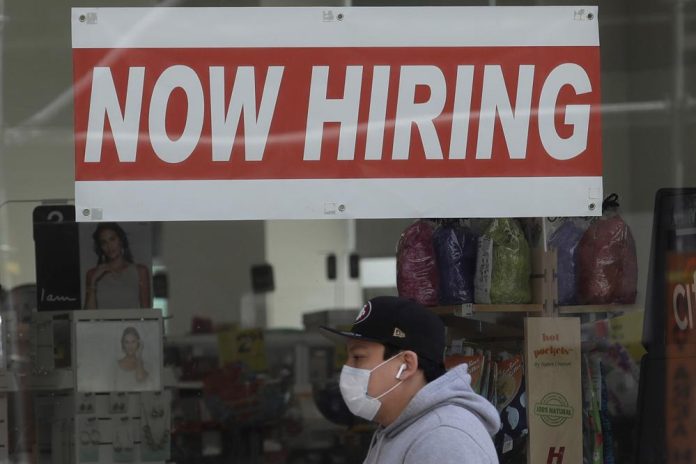
By ADAM BEAM, AP News
SACRAMENTO, Calif. (AP) — California said Friday it had recovered all of the 2.7 million jobs it lost at the start of the pandemic, a moment that normally would celebrate the end of a downturn but instead was tempered by signs of a wobbly economy amid layoffs in the state’s historically strong tech industry.
The 56,700 new jobs California employers added in October was enough to push the state past the symbolic milestone, led by strong gains in the state’s health care, professional services and leisure and hospitality industries. California has now had positive job growth for 13 consecutive months.
“The pandemic was one of the largest loss of jobs that we have experienced in history,” said Sung Won Sohn, a professor of economics at Loyola Marymount University who follows California’s job market closely. “The recovery was strong enough that we have regained the lost jobs and then some. So to me, this is a significant milestone.”
Despite the job gains, state officials have been warning of a possible economic recession. Inflation remains stubbornly high, making everything more expensive. The Federal Reserve has increased a key interest rate, which has had a chilling effect on the rest of the economy. Some of Silicon Valley’s best known companies — Facebook, Lyft, Cisco, Salesforce — have announced layoffs. And California government officials announced Wednesday they are anticipating a $25 billion budget deficit next year.
“California has now fully recovered all jobs that were lost to the pandemic-induced recession, but we know this isn’t the finish line,” Newsom said in a statement.
Those competing messages have made it difficult to interpret the health of the state’s economy, which if it were a separate country would be the fifth largest in the world.
California’s pandemic job recovery was notably faster than previous downturns, including the Great Recession, when it took six years for the state to recover all of its lost jobs, according to Michael Bernick, a former director of the California Employment Development Department who is now an attorney with Duane Morris.
But California has been slower to recover all of its lost jobs compared to the rest of the country.
“To some extent, we are lagging behind the U.S. economy,” Sohn said. “The tech sector used to be the workhorse of California’s economy, generating employment. And now it’s become a drag.”
Zachary Davis, who co-owns four ice cream locations and a café in the beach town of Santa Cruz, laid off 70 of his 75 employees at the start of the pandemic. More than two years later, the shop now has 85 workers.
“Some things are better, some things are worse. Everything is different,” Davis said. “I certainly don’t feel like we’re back to where we were.”
On paper, Davis said the company sales are back to normal. But the business looks and feels different. Some of their more experienced employees chose not to return to work — a trend that contributed to a nationwide labor shortage. It took a while to find their replacements. Now the company’s workforce is much younger, mostly college students or recent graduates.
“This was a seismic event for the world. … It almost feels a little crass to be celebrating the fact that we’re still in business when there was tremendous loss of life,” he said. “I feel really luck and I really feel for the people that suffered a lot more than we did.”
Employment also looks different for Jerry Irvin, who before the pandemic owned his own towing company and part of an auto body shop. The pandemic dried up his business overnight, forcing him to sell his trucks and close the body shop. He went two years without work, surviving from unemployment benefits while fearful for the future of his young daughter.
While he’s no longer a business owner, he did find another job as the forestry project coordinator for the Fresno Workforce Development Board — a job where he helps other people find work.
“I think that makes me more determined to help as many people as I can, because someone helped me,” Irvin said. “If I can express anything, it’s the fact that for everyone not to give up hope, that there is help out there.”

